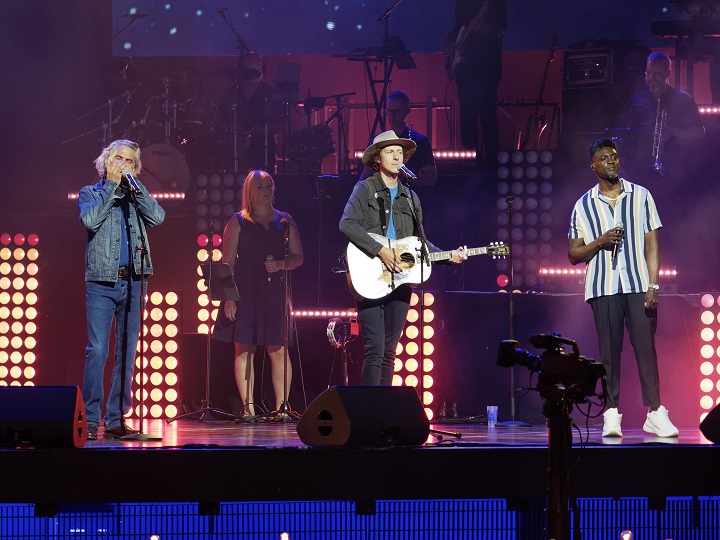There were no cheering crowds, no spectators waving flags and no one sporting blue-and-white fleur-de-lis face paint during Fête nationale festivities that were presented amid the coronavirus pandemic on all major television networks on Tuesday evening.

Instead, artists gathered on stage to celebrate Quebec culture at the Cogeco Amphitheatre in Trois-Rivières, performing not only great Québécois classics but also emphasizing the contributions of First Nations and Inuit to the history of Quebec.
Yannick Nézet-Séguin kicked off the celebration with an extract from the Overture Maslenitsa, opus 36 by the composer Airat Ichmouratov.
The conductor directed musicians who respected physical distancing to launch the show, which was broadcast on Télé-Québec, Radio-Canada, TVA and V.
The event was hosted by Ariane Moffatt and Pierre Lapointe, who pre-recorded their performances on Monday.
Roch Voisine, Gregory Charles and Luce Dufault interpreted Bobépine by Plume Latraverse, accompanied by dozens of singers who sang directly from their home.
Marie-Mai took over Je danse dans ma tête, popularized by Céline Dion, during a medley in which Moffat and Lapointe interpreted Les Larmes de métal from the group Soupir.
A statement from Premier François Legault was presented in the first half of the show.
Legault stressed that Quebec was built with the help of Indigenous Peoples while also taking care to emphasize that people from all over the world “had come to join us.”
“In 2020, the Quebec nation will rise, more united, stronger, more proud,” Legault said, referring to the health crisis and its consequences.
Michel Rivard and Marie-Michèle Desrosiers offered a few songs from the Beau Dommage repertoire. They notably sang the hit Amène pas ta gang, translated as “Don’t bring your gang,” whose lyrics seemed to be a nod to physical-distancing rules.
Corneille in a Montreal lane, Mara Tremblay on a balcony and Martha Wainwright on the roof of a building then accompanied them to deliver the Le blues d’la métropole.

In the second part of the show, Lapointe pointed out that the Cogeco Amphitheatre, where the show was recorded, was located on unceded Indigenous territory, saying: “We recognize the Attikameks as the guardians of the lands and waters on which we gather together tonight” while Rivard interpreted the song Rivière.
Actor Christine Beaulieu then gave a tribute to the rivers of Quebec, “which are our energy and our greatest wealth” by taking the time to say “thank you to the rivers” in several Indigenous languages.
The artist Elisapie, born to an Inuk mother, gave one of the patriotic speeches, calling for living in a united world “which never again lets anyone down along the way, the most visible, the new, the fragile, the different, the less young, the less wealthy, the distant, the skinned, those who can no longer breathe or those who have not yet disappeared.”
“It is from our multitude that our wealth is born” said the Inuk singer before performing Moi, Elsie, a song written by Richard Desjardins, whose music was composed by Lapointe.
Those watching from whom were also treated to performances by Fred Pellerin, David Goudreault, Patrice Michaud, Lara Fabian, Louis-Jean Cormier, Isabelle Boulay, Émile Bilodeau, Coeur de pirate, Vincent Vallières, Alexandra Stréliski, Hubert Lenoir, Les Soeurs Boulay, Étienne Dupuis-Cloutier, Fouki, Les Trois Accords, Paul Piché, Diane Dufresne, Marie-Pierre Arthur and Jim Corcoran.
Festivities continue on Wednesday with all Quebecers invited to sing along to Gilles Vigneault’s Gens du Pays at 7 p.m.
“Whether from their balcony, from their window or from their yard, Quebecers are invited to come out and sing with pride,” a statement on the Fête nationale committee website reads.
The song was composed for the Fête nationale in 1975 and has been part of the Québécois repertoire since.
— With files from Global News’ Annabelle Olivier




Comments